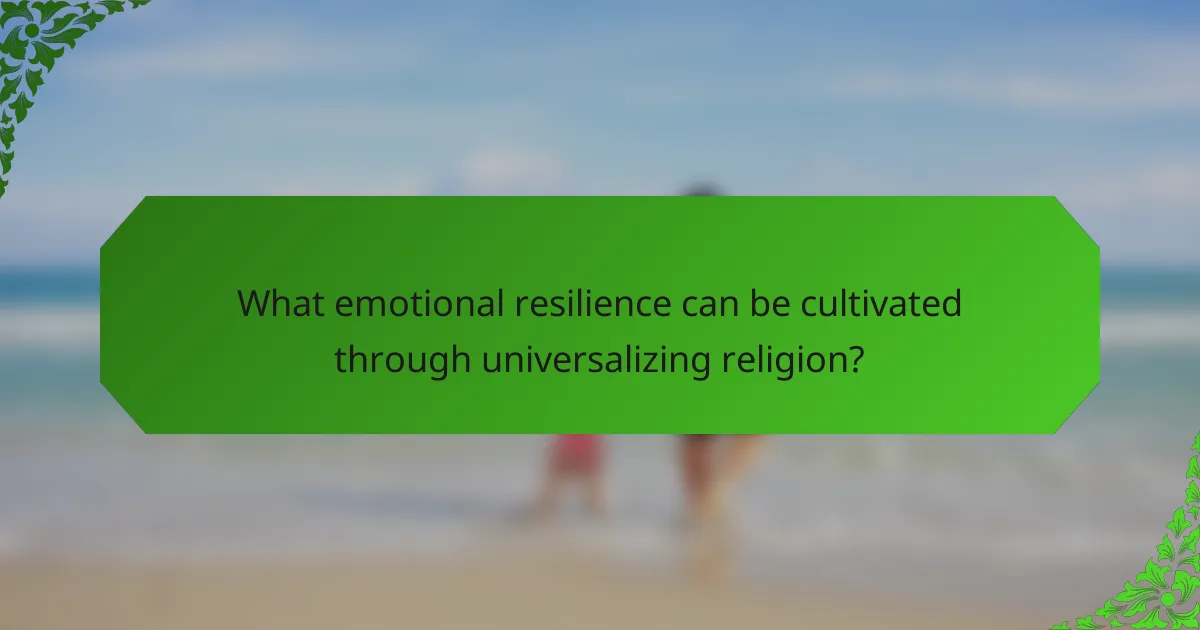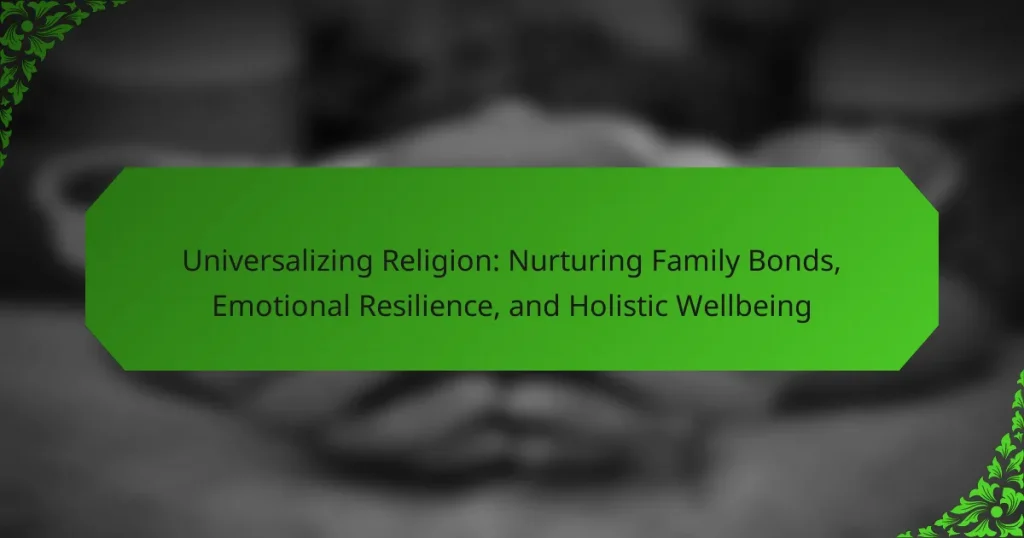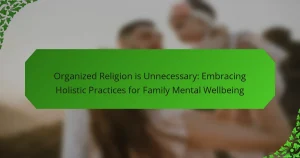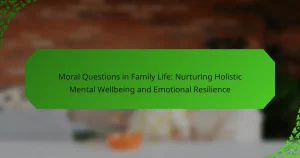Universalizing religion enhances family bonds, emotional resilience, and holistic wellbeing. It fosters shared values through communal practices, strengthens relationships via rituals, and promotes compassion for conflict resolution. Additionally, it encourages collective support, leading to a cohesive family unit and a robust emotional framework. By focusing on spiritual growth, families can achieve a well-rounded sense of wellbeing.

How does universalizing religion strengthen family bonds?
Universalizing religion strengthens family bonds by fostering shared values, enhancing emotional resilience, and promoting holistic wellbeing. Families united in faith often experience deeper connections through communal practices and shared beliefs.
Engagement in religious rituals provides a framework for family gatherings, enhancing communication and mutual support. For instance, shared prayer or worship can create a sense of belonging and collective identity.
Additionally, universalizing religions often emphasize compassion and forgiveness, which can help resolve conflicts within families. This emotional resilience is crucial for navigating challenges together, reinforcing familial ties.
Ultimately, the holistic approach of universalizing religions encourages families to support each other in both spiritual and practical aspects of life, leading to stronger bonds and a more cohesive family unit.
What role do shared beliefs play in family unity?
Shared beliefs significantly enhance family unity by fostering emotional resilience and holistic wellbeing. These beliefs create a common foundation that strengthens relationships and promotes mutual understanding. Families that engage in shared religious practices report higher levels of emotional support and cohesion. For instance, studies show that families participating in communal rituals experience deeper connections and improved conflict resolution skills. This unity not only nurtures individual growth but also cultivates a supportive environment that benefits all family members.
How can rituals enhance family connections?
Rituals enhance family connections by fostering shared experiences and emotional bonding. Engaging in collective practices, such as family meals or holiday traditions, strengthens relationships and creates lasting memories. These rituals promote emotional resilience by providing a sense of stability and belonging, crucial for holistic wellbeing. Families that regularly participate in rituals report higher levels of satisfaction and cohesion, as these activities reinforce shared values and identity.
What are effective family rituals to adopt?
Effective family rituals to adopt include regular family meals, storytelling sessions, and shared outdoor activities. These practices enhance emotional resilience and strengthen family bonds. For example, weekly family dinners allow open communication and connection. Engaging in storytelling fosters creativity and shared values. Outdoor activities promote physical wellbeing and teamwork. Consistency in these rituals cultivates a supportive family environment.
How does community involvement support family relationships?
Community involvement strengthens family relationships by fostering shared values and emotional support. Engaging in communal activities enhances communication and trust among family members. Families participating together in community service or events build a sense of belonging and purpose. This collective experience nurtures emotional resilience, as families face challenges together, reinforcing their bonds. Ultimately, active community engagement contributes to holistic wellbeing, as families create lasting memories and deepen their connections.

What emotional resilience can be cultivated through universalizing religion?
Universalizing religion can significantly enhance emotional resilience by fostering a sense of belonging and purpose. This connection strengthens family bonds and encourages supportive communities. Engaging in shared rituals and beliefs promotes emotional stability, reducing stress and anxiety. Furthermore, universalizing religions often emphasize forgiveness and compassion, which can help individuals navigate personal challenges. By cultivating these attributes, adherents develop a robust emotional framework that supports holistic wellbeing.
How do religious teachings promote coping strategies?
Religious teachings promote coping strategies by fostering emotional resilience and community support. They provide frameworks for understanding life’s challenges, encouraging practices like prayer and meditation that enhance mental well-being. These teachings often emphasize values such as forgiveness and gratitude, which can improve interpersonal relationships and reduce stress. Additionally, participation in religious communities offers social support, creating a sense of belonging that further aids in coping with adversity.
What are the mental health benefits of faith-based practices?
Faith-based practices enhance mental health by fostering community, promoting emotional resilience, and providing a sense of purpose. These practices nurture family bonds, which are essential for emotional support. Research indicates that individuals engaged in faith-based activities report lower levels of anxiety and depression. Additionally, spiritual practices can improve coping mechanisms during stress, contributing to holistic wellbeing. Engaging in these practices often leads to increased feelings of hope and belonging, which are crucial for mental health.

What unique aspects of universalizing religion contribute to holistic wellbeing?
Universalizing religions foster holistic wellbeing through shared values, community support, and emotional resilience. These religions promote family bonds by encouraging collective practices and rituals that strengthen connections. Emotional resilience develops through teachings that emphasize forgiveness, compassion, and purpose, helping individuals navigate life’s challenges. Additionally, the inclusive nature of universalizing religions creates diverse communities that offer social support, enhancing overall mental and emotional health. Such unique aspects contribute significantly to a well-rounded sense of wellbeing, fostering a sense of belonging and purpose in life.
How do diverse religious perspectives enhance family dynamics?
Diverse religious perspectives enhance family dynamics by fostering understanding, empathy, and emotional resilience. Exposure to various beliefs encourages open dialogue, strengthens bonds, and promotes holistic wellbeing. Families that embrace multiple faiths often experience enriched communication and a deeper appreciation for diverse values. This diversity can lead to innovative conflict resolution strategies and a supportive environment that nurtures individual growth.
What unique practices support emotional health in families?
Engaging in unique practices such as shared rituals, open communication, and community involvement significantly supports emotional health in families. These practices foster emotional resilience and strengthen family bonds. Shared rituals create a sense of belonging, enhancing emotional stability. Open communication encourages trust and understanding, essential for navigating challenges. Community involvement provides external support, enriching family life and promoting holistic wellbeing.

What rare attributes of universalizing religion impact family life?
Universalizing religions foster family life through unique attributes such as shared rituals, community support, and moral frameworks. These elements enhance emotional resilience and encourage holistic wellbeing. Shared rituals create bonding experiences, while community support provides networks for assistance. Moral frameworks guide family values, promoting stability and cohesion.
How can interfaith dialogue enrich family experiences?
Interfaith dialogue enriches family experiences by fostering understanding, respect, and emotional resilience. It encourages families to explore diverse beliefs, enhancing communication and empathy. Shared values from different faiths can strengthen family bonds, promoting holistic wellbeing. Engaging in interfaith discussions can also provide unique perspectives on life’s challenges, helping families navigate conflicts with compassion.
What uncommon practices can families adopt for wellbeing?
Families can adopt uncommon practices such as integrating shared spiritual rituals, engaging in community service, and fostering open discussions about emotions. These practices nurture family bonds and enhance emotional resilience. For instance, regular family volunteering can instill a sense of purpose and connection. Additionally, creating a family book club focused on diverse spiritual texts can encourage dialogue and understanding. Emphasizing gratitude through weekly reflections can also strengthen relationships and promote holistic wellbeing.

How can families apply universalizing religion principles for practical benefits?
Families can apply universalizing religion principles to enhance relationships, foster emotional strength, and promote overall wellbeing. These principles focus on shared values, compassion, and community support.
By practicing empathy and understanding, families can create a nurturing environment. Engaging in rituals or traditions strengthens family bonds and fosters a sense of belonging.
Incorporating universalizing religion teachings can enhance emotional resilience. Families can learn conflict resolution skills and develop coping strategies through shared beliefs, leading to healthier communication patterns.
Holistic wellbeing is achieved by prioritizing spiritual growth alongside physical and mental health. Families can participate in community service, promoting altruism and interconnectedness, which enhances their collective wellbeing.
What are the best practices for integrating faith into daily family life?
Integrating faith into daily family life fosters stronger bonds and emotional resilience. Begin with shared rituals, such as prayer or meditation, to create a sense of unity. Encourage open discussions about faith values, allowing family members to express their beliefs and experiences. Incorporate service activities, promoting empathy and community connection. Lastly, model faith-based principles in daily interactions, reinforcing positive behaviors and attitudes.
What common mistakes should families avoid when exploring spirituality?
Families should avoid imposing beliefs, neglecting open dialogue, and overlooking individual spiritual needs. These mistakes can hinder emotional resilience and family bonds. Encouraging exploration and respect for diverse perspectives fosters holistic wellbeing. Engaging in shared spiritual practices can strengthen connections while allowing personal growth.
How can families optimize their approach to holistic wellbeing through religion?
Families can optimize their approach to holistic wellbeing through religion by integrating spiritual practices into daily life. This fosters emotional resilience, strengthens family bonds, and promotes overall wellbeing. Engaging in shared religious activities, such as prayer or community service, enhances connection and support among family members.
Religious teachings often emphasize values like compassion and forgiveness, which can improve family dynamics. As a result, families practicing these principles may experience reduced conflict and increased harmony. Additionally, rituals and traditions provide a sense of stability and belonging, contributing to emotional health.
Incorporating mindfulness and meditation, often found in religious practices, can further enhance mental wellbeing. These techniques help families manage stress and cultivate a positive outlook. Regular participation in religious communities can also offer social support, reinforcing a sense of belonging and purpose.
Ultimately, a holistic approach to wellbeing through religion not only nurtures individual growth but also strengthens familial relationships, creating a supportive environment for all members.




